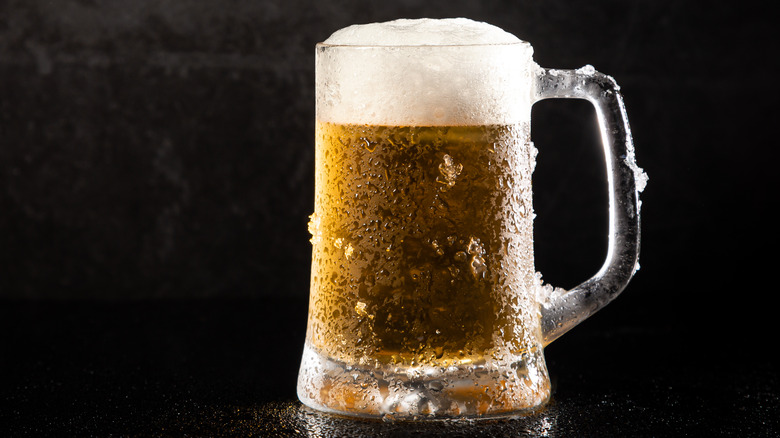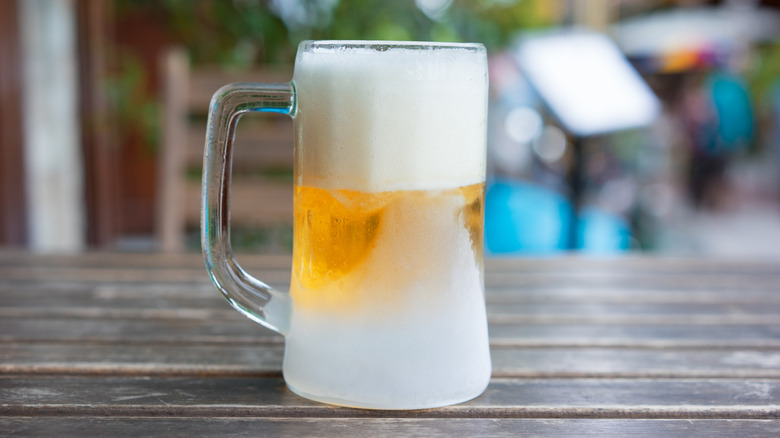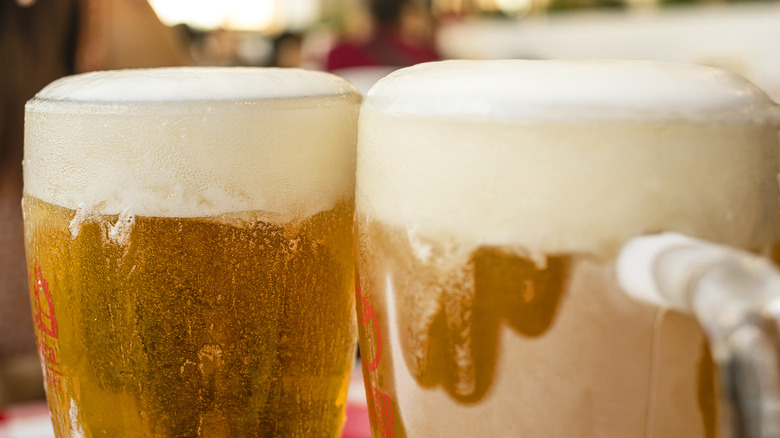The Reason Beer Is Commonly Served In An Ice Cold Glass
Cracking open a cold one is a near-universal pleasure, as beer has long been made by people in virtually every part of the world. And on hot days, "cold" is the operative word — there's hardly anything more refreshing than a chilly brew to cool you down when the weather is stifling. Seeing your bartender plunk a frosty mug down in front of you tends to provide a special, if everyday, kind of joy.
But while frozen beer glasses are fairly common, you're unlikely to see glasses for wine, soft drinks, or even most cocktails covered in frost. If you've ever wondered why beer is unique in this aspect, the answer is simple (kind of): It makes the beer extra cold, just the way many folks like it, without watering it down as ice cubes would.
If cold beer doesn't sound particularly controversial, you may be surprised to learn that the topic generates pretty strong feelings from professionals in the beer industry. That's because beer experts say that serving a beer too cold actually degrades the experience, making it more difficult to sense some of the subtler flavor complexities. And if you're drinking a lovingly made (and potentially expensive) craft beer, that's the last thing you want.
To freeze or not to freeze
Temperature is an important factor in properly serving beer — 40 to 55 degrees Fahrenheit is considered the sweet spot, with different beer styles demanding more specific temperatures. Most brewers, bartenders, and especially cicerones (think sommeliers, but for beer) will argue that freezing your glass before pouring will result in the beer becoming too cold and thus subduing the unique bouquet of aromas and flavors that brewers work so hard to cultivate.
Beer that's too warm, however, is no good either, as any beer drinker can tell you. Even the pros might give you a pass for using a frosted glass if the beer you're pouring into it hasn't been refrigerated. It's not a bad way to cool down a room temperature beer, and definitely superior to dropping in some ice cubes. No self-respecting restaurant or bar would ever serve your beer over ice, because as it melts, the water will dilute the flavor and body. That's not a big deal with a $2 fountain soda, but watering down a craft beer with complex flavors that goes for $8 or $9 is, arguably, kind of a waste.
The other scenario in which frozen glasses are acceptable is when they're holding macrobrews — you know, the big-name, low-price lagers that are made for crushing at backyard cookouts or during sports games. Those beers aren't known for their complexity of flavor, so even if a frosty glass desensitizes your tastebuds and tempers the beer's flavor to some degree, you're not missing much.
Icy or room temp beer mug: It's up to you
All of that said, you're under no obligation to follow beer-serving best practices when you're just pouring them at home for yourself and your friends. If you prefer to drink your dry double-hopped imperial IPA in a glass fresh from the freezer, by all means, go ahead — there are no beer police waiting to knock down your door. (If you post a picture of your frozen glass on Instagram, however, just know that your beer nerd cousin is probably judging you. Not that you should care.)
To get your glasses icier than a car windshield in January, start with a glass that's room temp or cooler. Putting a warm glass fresh from the dishwasher in the freezer could cause it to crack or even shatter due to the temperature contrast. Mugs are a popular choice since their thick, sturdy construction makes them less prone to cracking, but you can ultimately use whatever glass best suits the beer style you're drinking, or your personal preference. Run some cold water over the outside of your glass of choice before freezing to help the frost form.
Regardless of what the pros say, there's nothing wrong with drinking a beer that's literally icy cold, if that's what you want. At least you're not freezing the beer itself, or worse, plopping in ice cubes that have been flavored by frozen broccoli, holiday leftovers, and whatever else might be lurking in your freezer.


